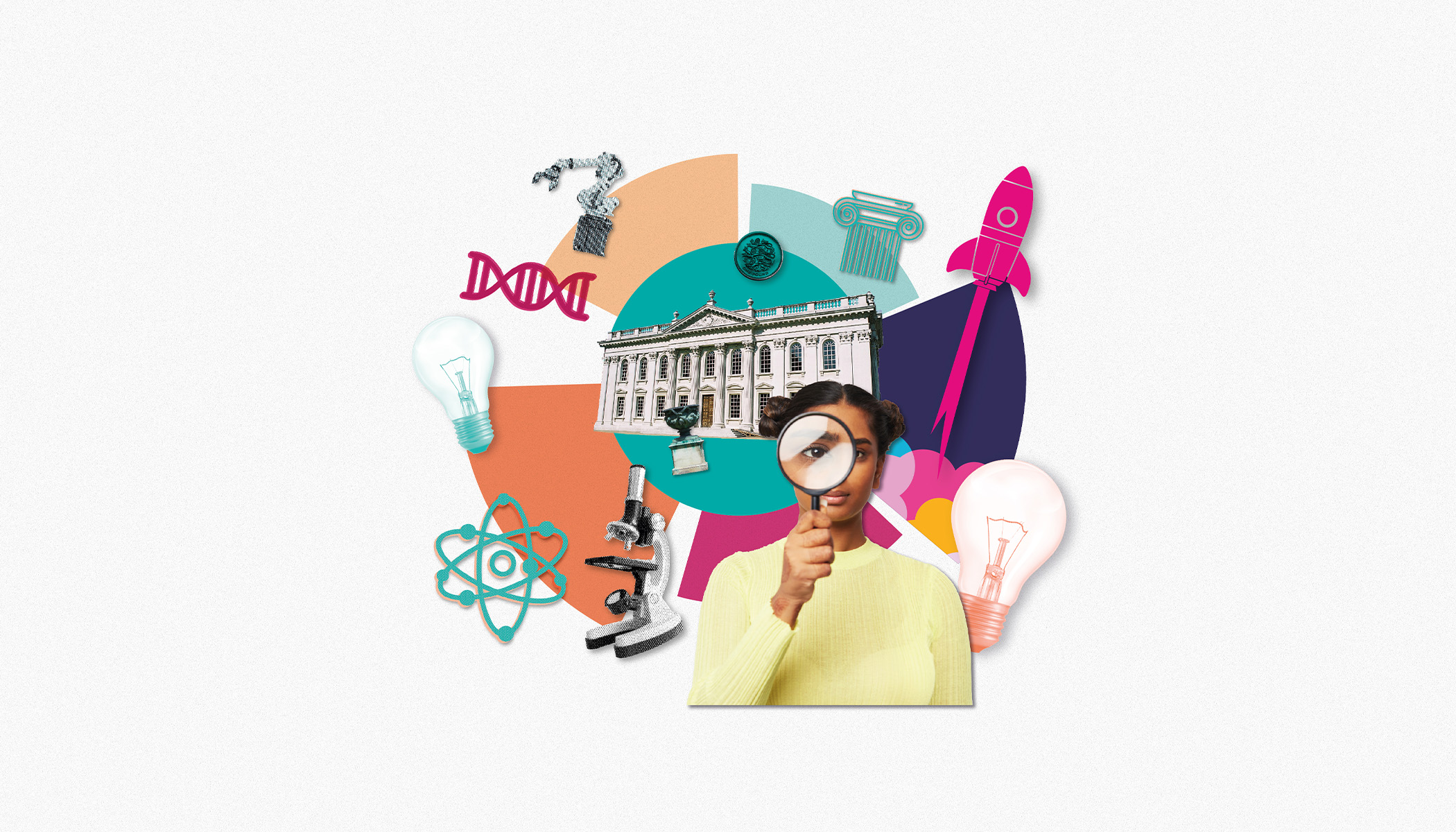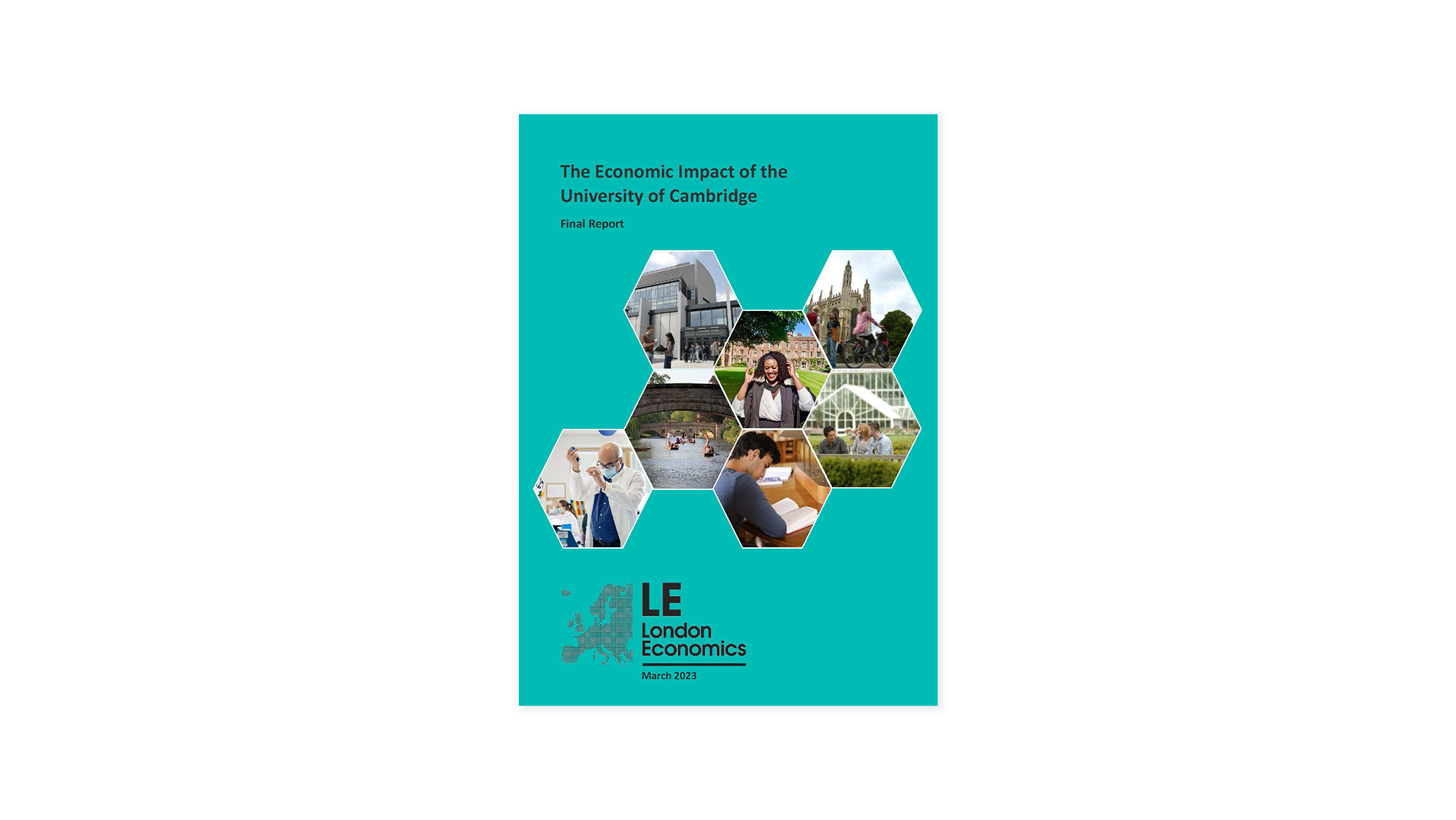The University contributes nearly £30 billion to the UK economy and supports more than 86,000 jobs across the UK, including £23.1 billion from research and knowledge exchange activities.
A report by London Economics has measured the University of Cambridge’s impact on the UK economy in 2020-21.
London Economics, one of Europe’s leading specialist economics and policy consultancies, was commissioned to assess the University’s economic impact through a range of activities.
The total impact, estimated at £29.8 billion, includes:
- £23.1 billion – from the University’s research and knowledge exchange activities (including commercial companies spun out from, or closely associated with, the University and other commercial activity carried out at the University)
- £4.69 billion – from the impact generated by the spending of the University and its colleges
- £716 million – from the University’s educational exports
- £693 million – from the University’s teaching and learning activities
- £587 million – from the impact of tourism associated with the University
The report estimated that the University supports more than 86,000 jobs across the UK, including 52,000 in the East of England, and contributes over £13 billion in gross value added (GVA).
For every £1 the University spends, it creates £11.70 of economic impact.
For every £1 million of publicly funded research income the University receives, it generates £12.65 million in economic impact across the UK.
London Economics also carried out a comparison of the costs and benefits associated with almost 600 government regulatory impact assessments and found that very few government interventions bring higher economic benefits than investment in the University of Cambridge.
The Vice-Chancellor’s editorial
Dr Anthony Freeling reflects on the University’s impact and contributions to economic growth:
The mission of the University of Cambridge is to contribute to society through the pursuit of education, learning and research at the highest international levels of excellence.
In pursuing this mission, the University rightly focuses on academic excellence. We educate some of the brightest minds from the United Kingdom and from around the world. Cambridge has been the birthplace of many of the world’s greatest intellectual achievements, and has nurtured many of the world’s leading scientists and scholars – from Isaac Newton to Charles Darwin to Jocelyn Bell Burnell; and from Bertrand Russell to John Maynard Keynes to Mary Beard. Our 121 Nobel Prize Winners attest to this record.
There is an aspect of the University’s contribution to society that remains to be fully told – the story of Cambridge’s economic contribution to the UK.
Alongside their social and cultural impact, Cambridge graduates and academics make a significant contribution to the British economy through research breakthroughs and entrepreneurial activities, as well as through the enhanced value and the skills they bring to their employment.
This report by London Economics is a comprehensive attempt to estimate the economic value that the University of Cambridge brings to the UK.
The University of Cambridge’s activities have changed people’s lives for the better because we have been successful at getting research to market, and in doing so helped create significant economic growth both around Cambridge and across the UK. Some of the depth and breadth of this influence is illustrated on the University’s UK impact map and global impact map [see below], which contain examples of economic, health, social, environmental and other research impact mapped to regions of the UK and around the world.
Dr Anthony Freeling, Acting Vice-Chancellor, University of Cambridge:
“Cambridge is the most successful cluster and local ecosystem in the UK. Just over £23 billion (78%) of our economic impact is generated by the companies spun out from – or closely associated with – the University, as well as research and commercial activities carried out at the University. This includes the impact of 178 spinouts and 213 start-up companies that have connections to the University. It is the biggest impact of any university in the UK. Success is the result of long-term, strategic decisions that have established the University at the heart of one of the world’s most successful innovation and technology clusters.”
Dr Diarmuid O’Brien, Chief Executive, Cambridge Enterprise:
“Cambridge is the UK’s most successful entrepreneurial ecosystem and one of the world’s leading innovation clusters. Cambridge Enterprise is an important engine in delivering economic impact for the University of Cambridge, with knowledge transfer and commercialisation activities forming a significant proportion of the University’s contribution to the UK economy.”
Economic growth
Growing the Cambridge ecosystem into one of the world’s leading innovation clusters did not happen by accident. It is the result of a culture of excellence, underpinned by a depth and breadth of teaching, research and innovation that connects the discovery of new knowledge with the expertise to turn these ideas into companies and organisations that change people’s lives.
The University has helped harness a winning combination of venture capital, government-supported capital investment and infrastructure funding (e.g. the 2016 Cambridge City Deal) through a very deliberate strategy of investing in innovation and commercialisation over past decades that includes:
- Trinity College establishing the UK’s first science park in 1970;
- An enlightened IP policy that encourages further investment;
- A culture that encourages innovation and entrepreneurship;
- The establishment of both a knowledge transfer and early investment arm, Cambridge Enterprise, and a follow-on investment arm, Cambridge Innovation Capital, which makes capital available at all stages of the investment journey from pre-seed to early scaling.
To build on this success, Innovate Cambridge – founded by Cambridge Enterprise, Cambridge Innovation Capital and the University – is joining with more than 100 partners, including AstraZeneca, Microsoft and Arm, to develop an ambitious and broad-ranging vision of innovation for the Greater Cambridge area. The goal is to accelerate progress, and for the Greater Cambridge ecosystem to accomplish in the next 10 years the same success as in the past 25 years.
Achieving this ambition requires action in three areas of policy: better infrastructure in the city and region including laboratory space, affordable housing and transport; better access to talented, skilled individuals from across the world; and better investment and access to capital. The University and our partners across the UK will continue to work with the government to develop solutions in these areas and grow the economic impact of the University alongside academic excellence.
Dr Anthony Freeling
Acting Vice-Chancellor











